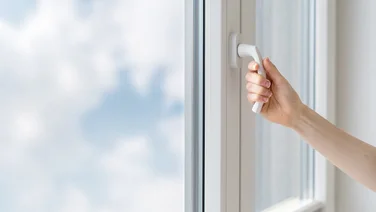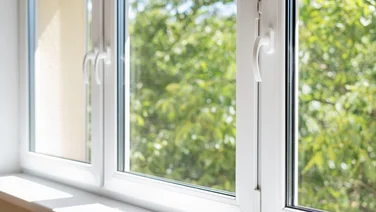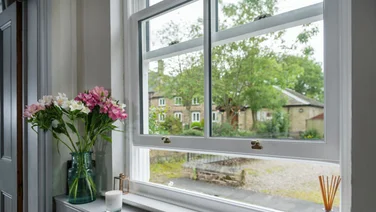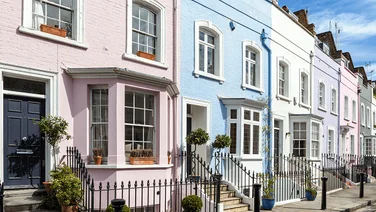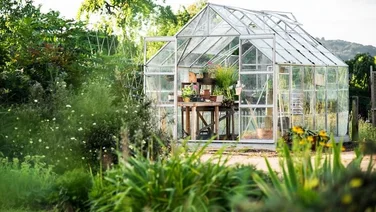We receive a small fee from trusted installers when you request a quote through our site. This helps us keep our content independent, well-researched and up to date – Learn more
- Double glazed windows usually last 25 to 30 years
- Single glazed windows typically last 15 to 20 years
- Well-maintained hardwood windows can last over 50 years

If you’re investing in a new set of windows, it’s only natural to want to know how long they’ll last – especially since the price of double glazed windows is quite high.
To help you figure out how long your current windows have left, and how you can choose the best option for their replacement, this article will go over everything you need to know, from the average window lifespans, to which type of windows last the longest. We’ll also give you tips on how to make your window last longer.
Want to skip the details and get new double glazing? We can help. Just fill in our quick form, and we’ll put you in touch with professional double glazing installers. They’ll reach out to you with their best prices.
What type of double glazing do you need?
Get startedHow long do single glazed windows last?
On average, single glazed windows last 15 to 20 years – or longer with the proper care.
But it can be difficult to determine exactly how long single glazed windows last because it varies, depending on a number of factors, including the frame material, how well-maintained the windows are, and their level of exposure to harsh weather conditions.
One reason single glazing might not last as long as you’d hoped is because it’s more susceptible to breakage than double glazing – after all, one pane is weaker than two.
Additionally, single glazing hasn’t been the norm in new builds for over a decade. So, if your home has single glazed windows, they might have been there for a while. If this is the case, it’s a good idea to get them assessed and see if they need replacing.
Your windows might need replacing if you notice drafts coming from them, cracks in the glass or frame, condensation forming on the pane, or an unusual increase in your energy bills. All these are indications that your windows have lost their insulating function.
What’s the best draught excluder for windows? Have a look at our dedicated page to start cutting energy and saving money.
How long do double glazed windows last?
Double glazed windows last 25 to 30 years, on average, but some types can last up to 50 years with the proper care.
As with single glazed windows, lifespan really depends on the window’s frame material, maintenance, and exposure to the elements.
Double glazed window panes are less likely to break than single glazed ones, not just because they have two panes, but because the inert gas between the two panes creates a pressure vacuum that makes the glass more resistant when struck.
However, this gas can also make the sealant in double glazed windows more likely to detach when subjected to quick temperature changes.
The gas can expand and contract in response to temperature changes, which can put strain on the sealant over time, and cause it to detach or crack.
What’s the best way to deal with condensation inside double glazing? Read our dedicated guide to find out.
What’s the average warranty on double glazed windows?
The average warranty period for double glazed windows is 10 years, which is less than half the lifespan of a typical window.
Some providers, such as Everest, offer warranties of up to 20 years, while others offer warranty periods as short as two years.
In general, short warranties are often a reflection of poor quality – of either materials or craftsmanship – so look for window installers with a warranty of at least a decade.
Has the lifespan of double glazing become longer?
The lifespan of double glazing hasn’t necessarily become longer over the past decade. However, older double glazing might have certain features that make the windows more susceptible to wear and tear.
Double glazing made 5 to 10 years ago has a 6-millimetre (mm) gap between the two panes, compared to a 16 mm gap in modern double glazed windows.
The short gap means older double glazed windows aren’t as good at insulating the home, and are more likely to suffer from condensation and mould than modern double glazed windows. Over time, the excess moisture can weaken the frame and seal of a window and shorten its lifespan.
What type of double glazing do you need?
Get started
Which types of double glazing last the longest?
Double glazed windows with aluminium or wooden frames tend to last the longest.
Aluminium windows can last at least 45 years, on average, and require very little maintenance, besides standard cleaning. Plus, aluminium is a corrosion-resistant metal, so there’s very little chance of it rusting or cracking.
For more information on aluminium double glazed windows, read our dedicated page.
Wooden windows have the potential to last up to 100 years. However, this highly depends on the type of wood they’re made of, and how well they’re maintained.
Hardwood frames are more durable than softwood frames, since the wood is denser and stronger.
Additionally, in order for wooden windows to last, they need to be regularly painted or varnished to keep the wood protected from the elements.
Window lifespan doesn’t really change depending on the style of the window. However, bay windows might be slightly more susceptible to degradation, since they tend to have more exposure to the elements, due to their design – they jut out of the house.
How often should uPVC windows be replaced?
uPVC windows usually last 20 to 25 years, after which point they might need to be replaced.
If you don’t want to replace them, you could also get away with doing simple repairs, such as resealing the windows, or getting the hinges replaced.
How much does a window cost in the UK?
The average window can cost anywhere from £300 to £3,600 to buy and install. The most expensive types of windows are double glazed windows, large windows, or ones with wood or aluminium frames.
It’s usually cheaper overall to have all your windows replaced at the same time, rather than replacing them one by one.
If you want to know how much new windows might set you back, look at our double glazing cost calculator.
Tips for making your windows last longer
There are a few ways to make your windows last longer, from regular cleaning to maintenance checks. Check out our top tips in the sections below.
Clean your windows regularly
Cleaning your windows regularly is the best way to make them last for a long time. Cleaning them twice a year should prevent dirt build up, which not only ruins your aesthetics, but can also corrode your window’s glass over time.
This is especially important if you live in a coastal area, since salt build-up will only speed up the degradation process.
Windows get mouldy because they are a barrier between a home’s interior and the outside, which means they are exposed to air moisture and vulnerable to condensation. Mould can get in through tiny spores that you will probably not see, so it’s really important to clean your windows, even if you can’t see any obvious dirt or mould.
Inspect your windows regularly
By regularly inspecting your windows for cracks in the frames or glass, loose hinges, or other issues, you can prevent small problems from becoming large ones over time.
It’s much easier, and cheaper, to fix a small crack than it is to replace a blown-in window.
Repaint or re-varnish wooden windows
Wooden windows require special care and maintenance if you want them to last a long time.
Having the wooden frames repainted or re-varnished every three to five years will keep them protected from the elements. It’s vital to prevent the frames from rotting or cracking – rotten or cracked wood windows often need to be entirely replaced. Mould on windows can also lead the frames to disintegrate over time.
Replace broken parts
When a small component of the window breaks, that doesn’t mean you need to replace the whole window. Some parts, such as hinges, handles, or pulleys in sash windows, can all be replaced individually.
You can also reduce the risk of these breaking by opening and closing windows slowly, and oiling metal hinges if they become stiff.
Reseal your windows if you notice a problem
Drafts, excess noise from outside, or condensation could all be signs that the sealant on the window has cracked or is detaching. Luckily, windows can be resealed if the damage is minor.
Doing this sooner rather than later will also reduce the probability that the whole window needs to be replaced.
You can read more tips for window draft-proofing by going to our page.
Summary
- With the proper care, windows can last 25 to 30 years – if not more.
- When the time does come to replace them, you could save around £195 on your energy bills by making the switch from single glazing to double glazing, according to the Energy Saving Trust.
- If you’re ready to get new double glazing, just fill in our quotes form. All you need to do is enter a few details, and we’ll pass them on to our network of installers. They’ll be in touch with their best prices.


